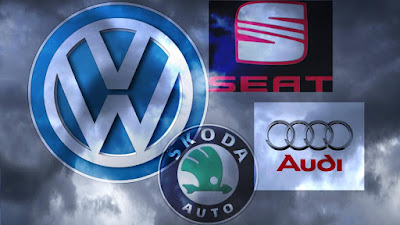Soon after the USA's EPA (Environmental Protection Agency)caught VW cheating emission standards with defeat devices, several developments
took place. To begin with, the Volkswagen Commercial Vehicles were also
implicated in the deception crisis. Things took a worse turn ever later when
EPA found similar defeat devices in larger 3.0-litre diesel engines used in
premium Volkswagen, Audi, and Porsche models, notably, 2014 Touareg, 2015
Porsche Cayenne, and 2016 A6 Quattro, A7 Quattro, A8, A8L, and Q5. The
3.0-litre diesel engine was developed by Audi, unlike the engines made by VW
implicated in the deception earlier. Further, large SUVs with higher engine capacity
and emissions are increasingly suspected in a scam that started with family
sedans. Although VW group is still denying the allegation, EPA's plan to test
all light-duty diesel vehicles on sale in US will bring more clarity on the
list of emission deceiving cars.
Adding to owes, fresh reports on inconsistent Co2 emission
levels proved that VW's road of deceit is unending. Early this month,
Volkswagen admitted that about 800,000 cars emit more carbon dioxide than
levels reported to regulators of different markets, as revealed by the
company's internal investigation. VW was vague in its statement, saying a
“majority” of the affected cars were diesels, but without specifying which
ones. Nor it is clear whether the models it refer to are the ones already
affected by the diesel scandal using a defeat device. Out of the 8 million odd
cars, about 430,000 were new 2016 models across the group's subsidiary brands
such as Volkswagen, Audi, Skoda and Seat. It is also possible that older models
be added to the list in the days to come with comprehensive investigations on
cars that flout permissible Co2 limits.
Volkswagen, last week, halted the production of 2016 Passat
Diesel in United States. Porsche and Audi has stopped selling select diesel
models including that of the Cayenne and Q7. VW has already initiated several
efforts to salvage its customer's trust by its 'Goodwill Package'. This
includes open apologies and several incentives to owners of the affected cars,
better valuation for their cars at the company's used car mart.
Repercussions in India
Automotive Research Association of India (ARAI), India's
premier automobile research association, took suo motu on the emission scandal
and initiated a probe on cars sold by the VW group. As per the on-going probe,
ARAI has found models like VW Polo, Vento, Jetta and the Audi A4 (all
Indian-spec) register variations of 5-6 times more Co2 emissions in on-road
conditions as against the previously lab-tested levels. VW India has been
issued a notice from ARAI seeking explanation on the issue by the end of this
month.
This may seriously affect VW's plans to launch a series of
new cars in India in next two years, including the Beetle, Passat, Tiguan SUV
and a compact sedan based on the Polo platform. If the emission issue remain
unaddressed for some time or more models found guilty in flouting Co2 norms,
then the company will be forced to halt their diesel models and launch only the
petrol variants of the new cars until the issue has been resolved.
In general, Indian consumers aren't highly environmentally
conscious. It is unlikely that any emission fraud make big impacts in the
market, as long as Volkswagen’s fix of affected cars doesn’t make huge drop in
their fuel efficiency. However, VW's image as a 'qualified' automaker on the
lines of 'German Reliability' may receive huge blows. Perhaps, the company may
start with a new advertisement campaign of promise and honesty just like they
did in 2010 to break the ice in the Indian market.
The diesel scam is becoming dirtier day-by-day. The 'diesel
gate' is opening wider in its scope and complexity of problems with every fresh
revelations. Nevertheless, the issue is making deep impacts on the way emission
norms are perceived and implemented, pushing policy makers and industry think
tanks to evolve a more rigorous and effective emission regime.
Photos Credit: Fortune.com, Automotive.com, Paulmotor.ca
Photos Credit: Fortune.com, Automotive.com, Paulmotor.ca




Comments
Post a Comment